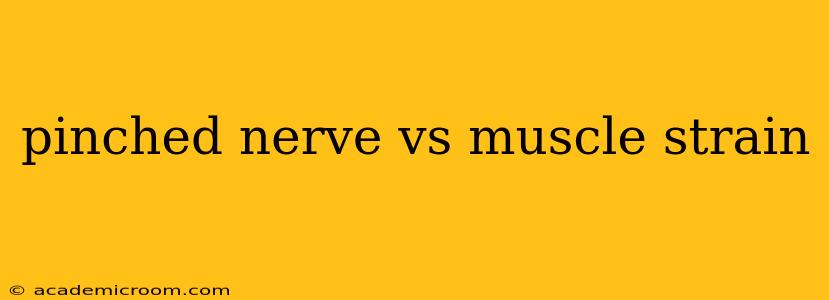Experiencing pain in your neck, back, or limbs can be debilitating. Two common causes are pinched nerves and muscle strains. While both can cause significant discomfort, they stem from different underlying issues and require different approaches to treatment. This article will delve into the key distinctions between a pinched nerve and a muscle strain, helping you better understand your symptoms and seek appropriate care.
What is a Pinched Nerve?
A pinched nerve, also known as a compressed nerve, occurs when surrounding tissues, such as bones, cartilage, muscles, or tendons, put pressure on a nerve. This pressure can interrupt the nerve's ability to send signals, leading to a range of symptoms depending on the location of the pinched nerve. The compression can be caused by various factors, including:
- Herniated disc: A ruptured or bulging intervertebral disc can press against a spinal nerve.
- Spinal stenosis: Narrowing of the spinal canal puts pressure on the spinal cord and nerves.
- Bone spurs: Extra bone growth can impinge on nerves.
- Repetitive movements: Repeated strain on a particular area can lead to nerve compression.
- Injury: Trauma, such as a fall or car accident, can cause a nerve to become pinched.
Symptoms of a Pinched Nerve
Symptoms of a pinched nerve are highly variable and depend on the affected nerve. Common symptoms include:
- Pain: Sharp, shooting, burning, or tingling pain.
- Numbness: Loss of sensation in the affected area.
- Weakness: Muscle weakness or atrophy.
- Tingling or prickling: A pins-and-needles sensation.
- Radiating pain: Pain that travels down the affected limb.
What is a Muscle Strain?
A muscle strain, or pulled muscle, is an injury to a muscle or tendon caused by overstretching or tearing of the muscle fibers. This often occurs during physical activity involving sudden movements or excessive force. Risk factors include:
- Lack of warm-up: Insufficient preparation before exercise increases the risk of muscle strain.
- Overuse: Repeating the same movements excessively can lead to muscle fatigue and strain.
- Improper technique: Incorrect form during exercise or activities puts extra stress on muscles.
- Muscle imbalance: Weakness in certain muscles can cause strain on others.
Symptoms of a Muscle Strain
Symptoms of a muscle strain usually manifest as:
- Pain: A dull ache or sharp pain in the affected muscle.
- Swelling: Inflammation and swelling around the injured muscle.
- Muscle spasms: Involuntary muscle contractions.
- Bruising: Discoloration of the skin due to bleeding under the skin.
- Limited range of motion: Difficulty moving the affected muscle.
Pinched Nerve vs. Muscle Strain: Key Differences Summarized
| Feature | Pinched Nerve | Muscle Strain |
|---|---|---|
| Cause | Nerve compression from surrounding tissues | Overstretching or tearing of muscle fibers |
| Pain Type | Sharp, shooting, burning, tingling | Dull ache, sharp pain |
| Other Symptoms | Numbness, weakness, radiating pain | Swelling, bruising, muscle spasms, limited ROM |
| Onset | Can be gradual or sudden | Usually sudden |
How are Pinched Nerves and Muscle Strains Diagnosed?
Diagnosis typically involves a physical examination and a review of your medical history. Imaging tests, such as X-rays, MRIs, or CT scans, may be necessary to confirm the diagnosis and rule out other conditions. For muscle strains, imaging tests are less frequently required unless there's suspicion of a more severe injury.
What is the Treatment for a Pinched Nerve?
Treatment options for a pinched nerve vary depending on the severity and cause. They can include:
- Rest: Avoiding activities that aggravate the symptoms.
- Over-the-counter pain relievers: Ibuprofen or naproxen can help manage pain and inflammation.
- Physical therapy: Exercises and stretches to improve flexibility and strength.
- Medications: In some cases, stronger pain relievers or muscle relaxants may be prescribed.
- Injections: Corticosteroid injections can reduce inflammation.
- Surgery: In severe cases, surgery may be necessary to relieve pressure on the nerve.
What is the Treatment for a Muscle Strain?
Treatment for a muscle strain typically focuses on:
- RICE method: Rest, Ice, Compression, and Elevation.
- Over-the-counter pain relievers: Ibuprofen or acetaminophen can help manage pain.
- Stretching and strengthening exercises: To improve flexibility and prevent recurrence.
- Physical therapy: To guide rehabilitation and prevent future injuries.
Can a pinched nerve cause muscle strain?
While not directly causing a muscle strain, a pinched nerve can lead to muscle weakness and atrophy in the affected area, increasing the susceptibility to strains from compensatory movement or reduced muscle function.
How long does it take for a pinched nerve to heal?
Recovery time for a pinched nerve varies greatly depending on the cause and severity. It can take several weeks or even months to fully heal.
How long does it take for a muscle strain to heal?
Most muscle strains heal within a few weeks with proper care, but severe strains may take longer.
This information is for general knowledge and does not constitute medical advice. Always consult a healthcare professional for diagnosis and treatment of any pain or discomfort. They can accurately assess your specific situation and recommend the most appropriate course of action.
